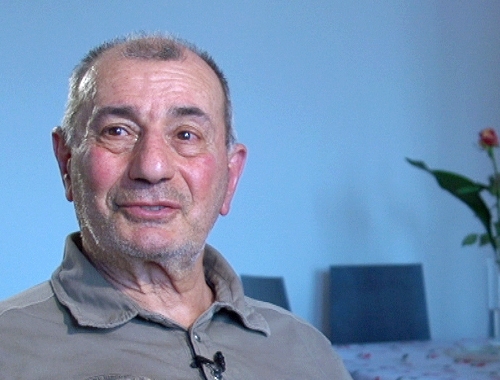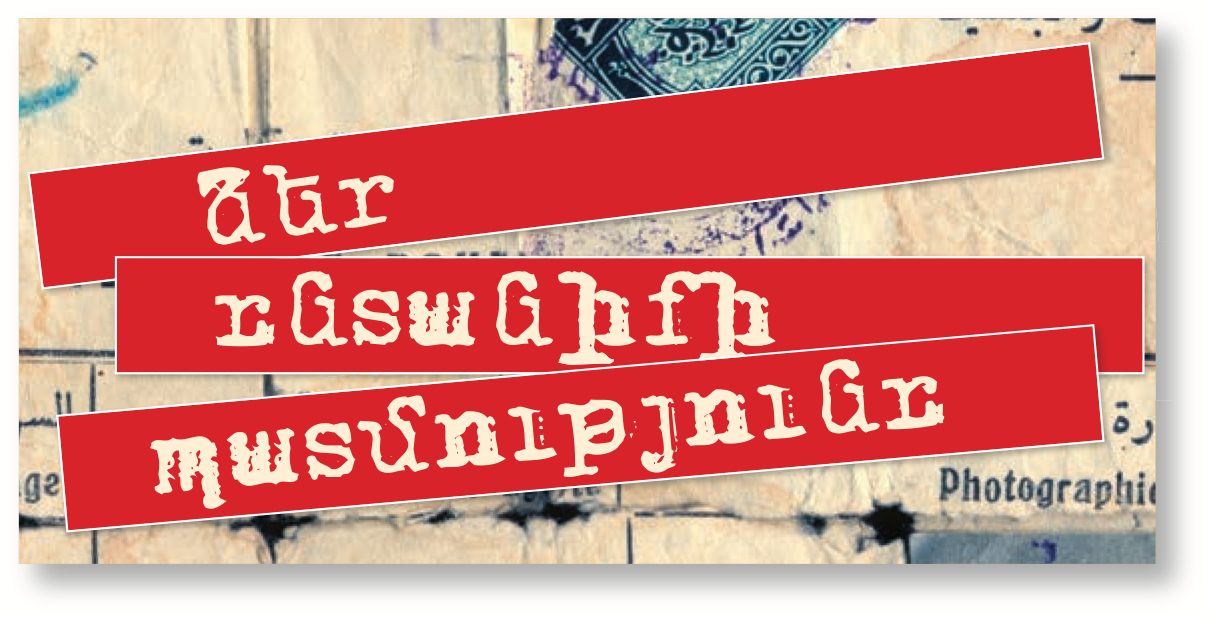 Immigrated from France in 1947
Immigrated from France in 1947
Pepo Ishlemejian
I was eight years-old. We lived in a Paris suburb. One day, after Armenian classes, I didn’t go home. My father went to the Armenian church and asked the guard where the children were. The guard said, they took them to Paris, there’s a performance there. My father knew that the Tashnags had taken them. He was very angry. They had given me a toy pistol. I returned home quite happy. My father said, “What right did they have to take you. Let them keep their Armenian. We will now go to Armenia. You will learn Armenia there.” That was the first time I heard about going to Armenia.
A few months later we went to Marseille. There, they put us in a holding camp. It was probably German, because it was concrete and had no windows. It was round and inside there were long armament depots. We stayed there a week or so until the Rosya ship arrived to take us to Batum.
My father said I will now take you to Batum and show you around. We saw beggars in the street, with medals on their chest. It left a bad impression, for a soldier to have that many medals and still have to beg. My father was surprised. “What’s happened? It was beautiful before. Batum looked like Paris.” He was in Batum in the 1920s.
I should say that later, when we arrived in Armenia, our furniture and belongings, didn’t arrive on the same ship. My father had ordered sixteen cubic meter containers. He said the hole in the Rosya was small and didn’t accept them. But two clever fellows were able to get their cars onboard. They were on pallets.
Our containers finally arrived. They had opened them up at customs to see what was inside. We had a huge mirror. They were looking at it backwards. When they saw it was a mirror, they let it pass. Yes, those containers came on a special train. When my father went to get the train ticket, he was wearing the most famous watch at the time. They removed it with a razor.
My father said, “I knew Armenia would be bad, that’s why I brought fifteen watches. I’ll sell them until we find work. We’ll eat.” That’s to say he was prepared.
Others, especially those from Syria, had no chairs or tables; nothing. They’d eat on the floor. No one from France had furniture. There were practically no well-off people among the immigrants. A person with money, the guy who built the factory, was Dolabjian. He was rich. There was a guy from America, Nazarian. He wasn’t rich but he brought chemical cleaning tools. There was no dry cleaning in Armenia. He opened a shop was on Marx Prospect, in the building behind the bathhouse. There might have been a few more rich people, but not from Egypt, America or France. And I won’t even mention Bulgaria, Greece or Romania. The rich didn’t come. The people were patriots, true patriots.
But my father was clever as well. Some came naked. We came with our belongings. We had bought 2-3 suits three and a half meters of boston material, and other valuable fabrics. Not for me. I was small and couldn’t take my measurements. He had bought many towels and sheets. When we returned to France from Armenia, we still had some towels. Imagine that.
There was a bleach factory in France. My father knew everyone there. He went to the owner and said, “I’m going to Armenia. Will you teach me how to make bleach?” The owner replied, “What assurances do I have that you won’t do that business here?” My father said he was telling the truth and that he was taking the family to Armenia. The man believed him and showed him how to make bleach.
We arrived in Armenia. They gave him a place in the chemical factory in the Zangou Gorge. My father started to make bleach there. There was a lack of people who could make bleach in Armenia. Later, they said to write to Moscow and that they’ll want bleach there too. He wrote a letter to Moscow, saying that he had started a bleach factory in Armenia and that it was well received. He wrote that he could do it in Moscow as well. The reply was that it wasn’t convenient and that it was dangerous if the people used bleach incorrectly.
My father was a director of a factory here. It was a factory that sewed bags. He worked on the up and up. Once some guys came to his office and said, “Don’t work like this. Cut one meter and give us the other. We’ll give you your share.” He said he wouldn’t and left that job. The immigrants weren’t such ‘bastards’. They were more honest. It wasn’t only him. So were the other repatriates. Even though there were all types.
At first, we lived in Yerevan’s Third District. Eight families lived in four apartments of three rooms each. We were three and got one room. There was no kitchen. There was no bathroom. There was a small hallway. Our neighbors were from Syria. When our items arrived, the hallway and room were filled. We lived like this for three years.
We woke one morning in 1949 and realized that they had taken the neighbors away during the night. They had been exiled. Years passed, Stalin died, and they returned. My mother asked – Garabed what did you do? Why did they take you? He answered that he had been a Tashnag. What Tashnag? The man didn’t know how to speak Armenian. They only knew that they were Armenian. So, what had happened. They lived in a backwards village in Syria. Some people showed up and asked them if they wanted to open an Armenian school for the kids. The visitors said they would but up the money but that the residents would have to put up some money to hire a teacher. These people were happy that their kids would learn Armenian. They gave the money and the kids went to school. They saw that things were progressing nicely. They came back and said, we are Tashnags and you have to become party members. The guy had no idea what a Tashnag was, what a Hnchak, Bolshevik, Menshevik was. He was a guy on that level. Later, when they came to Armenia, someone said that Garabed agha had been a Tashnag.
I went to school on my own. We arrived and I saw that the kids were going to school. The next day I talked to them and went to school. I said that I wanted to learn. I spoke the language poorly. They asked where I was from. I said from France. Believe it or not, they were teaching French in the school. Yes, my musical ear wasn’t bad, but I was able to grasp eastern Armenian immediately. I lost my accent, even though I spoke western Armenian well.
I attended classes there for three years until my father bought a semi-finished home in Yerevan’s Kilikia neighborhood and completed it. When the family got bigger, when we had kids, we moved to the 16th neighborhood.
I worked at the Mergelian Institute. Because they were doing secret stuff there, I wasn’t able to go abroad. Then too, I was born overseas. They only let me go once to Poland, as part of a group of young communists.
By 1990 everything had been relaxed. I came here (France) with my wife as tourists. We visited for one month and went back. We returned and recounted what we saw. My son said that he wanted to go as well. I sent a letter here, asking to send him a visa. They immediately sent it.
It was 1991. I remember the date well– April 24. He arrived in Paris. I telephoned him one day and said, “Michael, don’t come back. Things are getting worse here.” I arrived here in July-August.
My son had a job arranging paper flowers in a huge warehouse. But he worked as an engineer in Armenia for four years before he left. He did that menial work. Wherever he went looking for work, they said they didn’t need him. His French was poor. He couldn’t speak the language. Once, he received a letter saying they were interested in him. I forced him to go. The person who wrote him was a Pole. Maybe even a Jew. He asked my son what diploma he had. He should him the diploma that had numbers on it. My son says that the guy placed a finger on the spot that read “History of the USSR” and laughed. The guy knew that much Russian at least. He gave my son a technic (repairman) job. All my children have come here. All have purchased homes; good homes. They’ve settled in. Their children don’t know Armenian. It’s terrible. My son’s wife is Russian. He met her in Moscow. She’s a good girl. I’m very happy. She’s better than an Armenian.



















